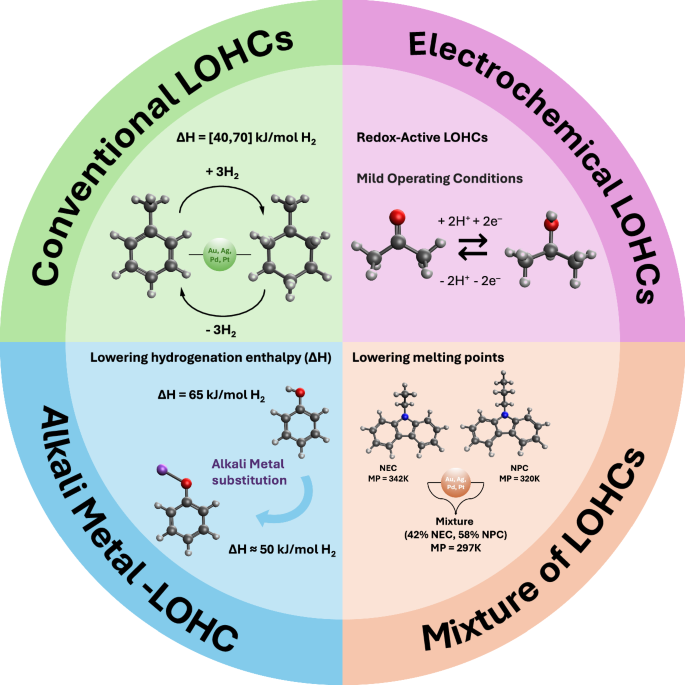Advancing Hydrogen Storage Technology through QM9-LOHC Dataset Expansion
Key Ideas
- Expansion of the QM9 dataset with G4MP2 enthalpies for 9,841 molecules and a (de)hydrogenation dataset of 10,373 reactions aims to explore hydrogen storage technologies.
- Research focuses on Liquid Organic Hydrogen Carriers (LOHCs) for efficient and safe hydrogen storage, addressing challenges of low energy density and gaseous handling complexities.
- Various LOHC systems such as conventional, mixtures, electrochemical, and alkali metal-LOHCs offer unique approaches to hydrogen storage; each system tailored for different properties and functionalities.
- Study of hydrogenation reactions is crucial for advancing LOHC technology, offering high-fidelity data for molecular discovery and optimization of both conventional and innovative systems.
The article discusses the substantial expansion of the QM9 dataset, adding G4MP2 enthalpies for 9,841 molecules and a dataset of 10,373 reactions related to (de)hydrogenation, focusing on Liquid Organic Hydrogen Carriers (LOHCs). This new dataset named QM9-LOHC aims to provide a resource for exploring hydrogen storage technologies. The challenges of hydrogen storage and transport due to low volumetric energy density and gaseous handling complexities are highlighted. LOHC systems, which involve hydrogenation and dehydrogenation reactions of organic carriers, are identified as crucial for efficient and safe hydrogen storage. The article categorizes LOHC systems into conventional, mixtures of LOHCs, electrochemical LOHCs, and alkali metal-LOHCs, each offering unique advantages for hydrogen storage. The research emphasizes the importance of studying hydrogenation reactions to advance LOHC technology, focusing on thermodynamic and kinetic properties. By utilizing various LOHC systems, researchers aim to address efficiency, cost, and practicality concerns related to hydrogen storage. The article emphasizes the significance of high-fidelity data for molecular discovery and the optimization of both conventional and innovative LOHC systems. Overall, the sentiment towards hydrogen in the article is positive, highlighting the potential of hydrogen storage technologies and the diverse approaches within the field of LOHC research.
Topics
Power
Technology
Sustainability
Research
Energy Storage
Energy Systems
Chemical Reactions
Liquid Carriers
Quantum Chemistry
Latest News
